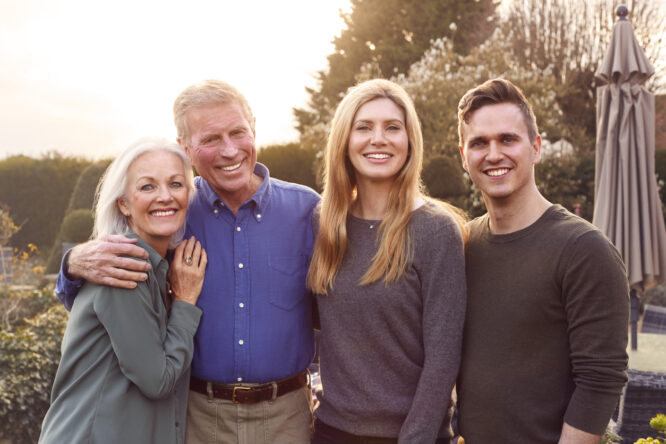Being the firstborn child in the family tends to come with some pretty intense expectations, from setting a good example for your younger siblings to carrying extra responsibilities.

After all, you can handle it, right? Eh, not necessarily. While this role can be rewarding, it can also feel overwhelming at times. The pressure to succeed, support your brothers and sisters, and meet family standards can sometimes feel like too much — it’s enough to make you want to run away sometimes. Finding ways to manage these expectations while still prioritising your own happiness is key to feeling more in control of your own life. After all, you don’t have to be everything for everyone, you know. Here’s how to break free — you deserve it.
1. Recognise that you can’t do everything perfectly.

It’s easy to feel like you have to be the one who always gets things right. Whether it’s excelling at school, work, or family responsibilities, the pressure to be “the responsible one” can sometimes feel like too much. But perfection is an impossible standard to hold yourself to, and constantly striving for it can lead to unnecessary stress. Accepting that mistakes and setbacks are a normal part of life helps take the pressure off and makes it easier to move forward with confidence.
2. Set boundaries with family expectations.

As the oldest, it’s common for family members to rely on you, sometimes without realising they’re asking too much. If you’re constantly expected to handle things that other people could take on, setting boundaries is crucial for protecting your time and energy. Learning to say no when necessary isn’t selfish — it’s a way to maintain balance and avoid burnout. Communicating your limits clearly helps everyone understand that while you care, you can’t always be the one to carry everything.
3. Acknowledge the pressure, but don’t let it define you.

Growing up with high expectations can make it feel like your achievements (or struggles) are constantly being measured. While it’s great to aim high, it’s also important to separate external expectations from your own personal goals. Ask yourself if the pressure you feel is coming from your own ambitions or from what other people expect of you. Taking control of your own narrative allows you to focus on what truly matters to you, rather than just living up to labels like “the responsible one” or “the role model.”
4. Avoid comparing yourself to your siblings.

When you’re the firstborn child, it’s easy to feel like you’re constantly being compared to your younger siblings. Whether you feel pressured to be the “gold standard” or frustrated when they’re treated differently, these comparisons can be exhausting. But every sibling has a different path, and their journey doesn’t have to impact yours. Letting go of these comparisons helps you focus on your own growth, allowing you to shape your life based on what makes you happy, not just how you measure up to other people.
5. Learn to delegate when needed.

Being the oldest often means you’ve been put in charge of things from a young age, whether it was helping with chores, schoolwork, or even emotional support for siblings. Over time, this can make you feel like you have to handle everything yourself, even as an adult. But just because you’re used to taking responsibility doesn’t mean you have to do it all alone. Encouraging everyone to take on their fair share not only lightens your load but also allows them to develop independence and responsibility.
6. Celebrate your accomplishments, big or small.

High expectations often mean you’re always looking ahead to the next milestone without pausing to acknowledge how far you’ve come. But every step forward, no matter how small, is worth celebrating. Whether it’s completing a project at work, supporting a family member, or simply making it through a tough week, taking time to recognise your efforts is important. You don’t need to wait for a major achievement to appreciate your hard work—small wins count just as much in the bigger picture.
7. Don’t be afraid to ask for support.

When you’re used to being the one people rely on, it can feel unnatural to ask for help yourself. But no one, no matter how responsible, can do everything alone. Having a support system makes challenges easier to manage and helps prevent feelings of isolation. Whether it’s leaning on friends, talking to someone you trust, or even going to therapy, allowing yourself to be supported is a sign of strength, not weakness.
8. Define success on your own terms.

Growing up with high expectations can sometimes make it feel like success is a checklist of what you “should” accomplish. But real success isn’t about meeting someone else’s version of achievement — it’s about finding what makes you fulfilled. Take the time to think about what you actually want, whether that’s career goals, relationships, or personal passions. By defining success for yourself, you can make choices that align with your happiness rather than just ticking off external expectations.
9. Release guilt over making decisions for yourself.

Many firstborn children struggle with guilt when they choose to prioritise their own happiness, especially if it means not fulfilling family expectations. But putting yourself first doesn’t mean you’re abandoning anyone. It’s okay to make choices that serve your well-being, even if they don’t align with what your parents or siblings expect of you. Letting go of guilt allows you to embrace your own path and live a life that feels authentic to you.
10. Let go of the need to be in control.

Being the firstborn often means feeling responsible for everyone else’s well-being. While it’s natural to care, constantly trying to manage everything can be exhausting and unrealistic. Trusting that people can handle their own choices, even if they do things differently from you, is important. Learning to step back reduces stress and gives those around you the space to grow on their own.
11. Find a balance between independence and connection.

When you’re used to handling things alone, it’s easy to lean too much on independence. But staying connected with people who understand and support you can make a huge difference in navigating expectations. Making time for friendships, hobbies, and relationships outside of family responsibilities creates a sense of balance. Having a life beyond being “the oldest” helps you feel more well-rounded and fulfilled.
12. Accept that mistakes are part of growth.

Feeling pressure to be the responsible one can make mistakes feel like personal failures. But in reality, making mistakes is how we learn and grow. No one gets everything right the first time, and expecting yourself to do so just adds unnecessary stress. Instead of dwelling on what went wrong, see mistakes as opportunities to improve. Being kind to yourself in these moments helps you move forward with confidence.
13. Learn when to say no.

Constantly saying yes to everything can lead to burnout. While it’s great to be there for other people, it’s also important to recognise when something is beyond your capacity. Setting limits doesn’t mean you don’t care, it just means you’re being realistic about what you can handle. Prioritising your own mental, emotional, and physical health allows you to show up for other people in a healthier way, without feeling drained.
14. Prioritise your own happiness.

It’s easy to get caught up in fulfilling expectations and forget what actually makes you happy. But there’s more to life than responsibilities; it’s also about finding joy, meaning, and fulfilment. Making time for what excites and inspires you, whether it’s travel, creativity, or simply moments of rest, is essential. Your happiness is just as important as anyone else’s, and prioritising it allows you to live more fully.
15. Remember, you are more than just “the oldest.”

While being the oldest might have shaped who you are, it doesn’t define your entire identity. You are more than your role in the family — you’re a unique human being with your own dreams and purpose. Give yourself permission to grow into the person you want to be, beyond the expectations placed on you. Embracing your individuality allows you to create a future that feels right for you.




